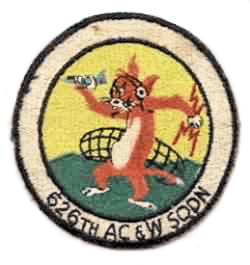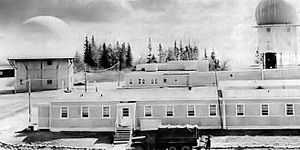Fire Island Air Force Station
Fire Island Air Force Station | |
|---|---|
| Part of Alaskan Air Command (AAC) | |
|
1962 photo | |
 Fire Island AFS Location of Fire Island AFS, Alaska | |
| Coordinates | 61°08′28″N 150°13′05″W / 61.14111°N 150.21806°W |
| Type | Air Force Station |
| Site information | |
| Controlled by |
|
| Site history | |
| Built | 1951 |
| In use | 1951-1969 |
| Garrison information | |
| Garrison | 626th Aircraft Control and Warning Squadron |
Fire Island Air Force Station (AAC ID: F-01) is a closed United States Air Force General Surveillance Radar station. It is located 11.9 miles (19.2 km) west-southwest of Anchorage, Alaska, on Fire Island. It was closed in 1969.
History
Fire Island AFS was a continental defence radar station constructed to provide the United States Air Force early warning of an attack by the Soviet Union on Alaska. Contracts were awarded during the spring of 1950, and work was started shortly afterwards on construction.
During World War II, the three by six mile Fire Island was accessible only by water, and served as a lookout site for United States Army Artillery units for sighting submarines. The station was located 2 miles west of the Anchorage International Airport, in Cook Inlet. All but the northwest corner of Fire Island was reserved. Improvements constructed by the Air Force included 33 buildings and structures utilized for operations, administration, maintenance, communications, a multi-purpose dormitory, radome towers, utilities, and an airstrip, which provided a means of getting personnel and supplies to the island by air.
The station was opened in September 1951, and the 626th Aircraft Control and Warning Squadron was activated, and initially the station functioned as a Ground-Control Intercept (GCI) and warning station. As a GCI station, the squadron's role was to guide interceptor aircraft toward unidentified intruders picked up on the unit's radar scopes. Radars operated were AN/CPS-6B, AN/FPS-8, AN/CPS-4, AN/FPS-20A, and AN/FPS-6B.
Fire Island AFS also operated as a Manual Control Center (MCC) site. With the creation of NORAD in 1957, Fire Island AFS became one of four NORAD Control Centers in Alaska. Its mission was to feed air defense data to the Alaskan NORAD Region Control Center (ROCC) at Elmendorf AFB where it was analyzed to determine range, direction, altitude, speed, and whether aircraft were friendly or hostile.
The USAF shared its radars with the United States Army Air-Defense Command Post (AADCP) for Nike missile-defense system (Anchorage Defense Area).
During the 1964 Alaska earthquake, the geography of the island was altered and the airfield on the island was lowered enough to put it under water during high tides, rendering it unusable. Major transportation to and from the station and resupply of perishable items had to be made by helicopter from Elmendorf AFB.
In 1969, the Joint Chiefs of Staff directed a reduction in air defense forces. As a result, the Fire Island NORAD control center was deactivated on 30 September 1969. The Army Air-Defense Command Post was moved to King Salmon AFS (F-03).
The station was transferred to the Federal Aviation Administration (FAA) after site closure. FAA terminated its use when the Long Range Radar (LRR) station at Kenai (A-14) became operational as a joint-use site in 1980.
In 1998 Pacific Air Forces initiated "Operation Clean Sweep", in which abandoned Cold War stations in Alaska were remediated and the land restored to its previous state. After years of neglect the facilities at the station had lost any value they had when the site was closed. The site remediation was carried out by the 611th Civil Engineering Squadron at Elmendorf AFB, and remediation work was completed by 2005. Today, very little remains of the former Fire Island Air Force Station.
Air Force units and assignments

Units:
- 626th Aircraft Control and Warning Squadron, reactivated 17 November 1950
- Inactivated 15 October 1969
Assignments:
- 531st Aircraft Control & Warning Group, 17 Nov 1950
- 10th Air Division, 13 April 1953
- 5039th Aircraft Control & Warning Group (later 5040th Aircraft Control & Warning Group, 1 June 1957
- 10th Air Division, 1 November 1959
- 5070th Air Defense Wing, 1 August 1960
- Alaskan Air Command, 1 October 1961 - 15 October 1969
See also
References
![]() This article incorporates public domain material from websites or documents of the Air Force Historical Research Agency.
This article incorporates public domain material from websites or documents of the Air Force Historical Research Agency.
